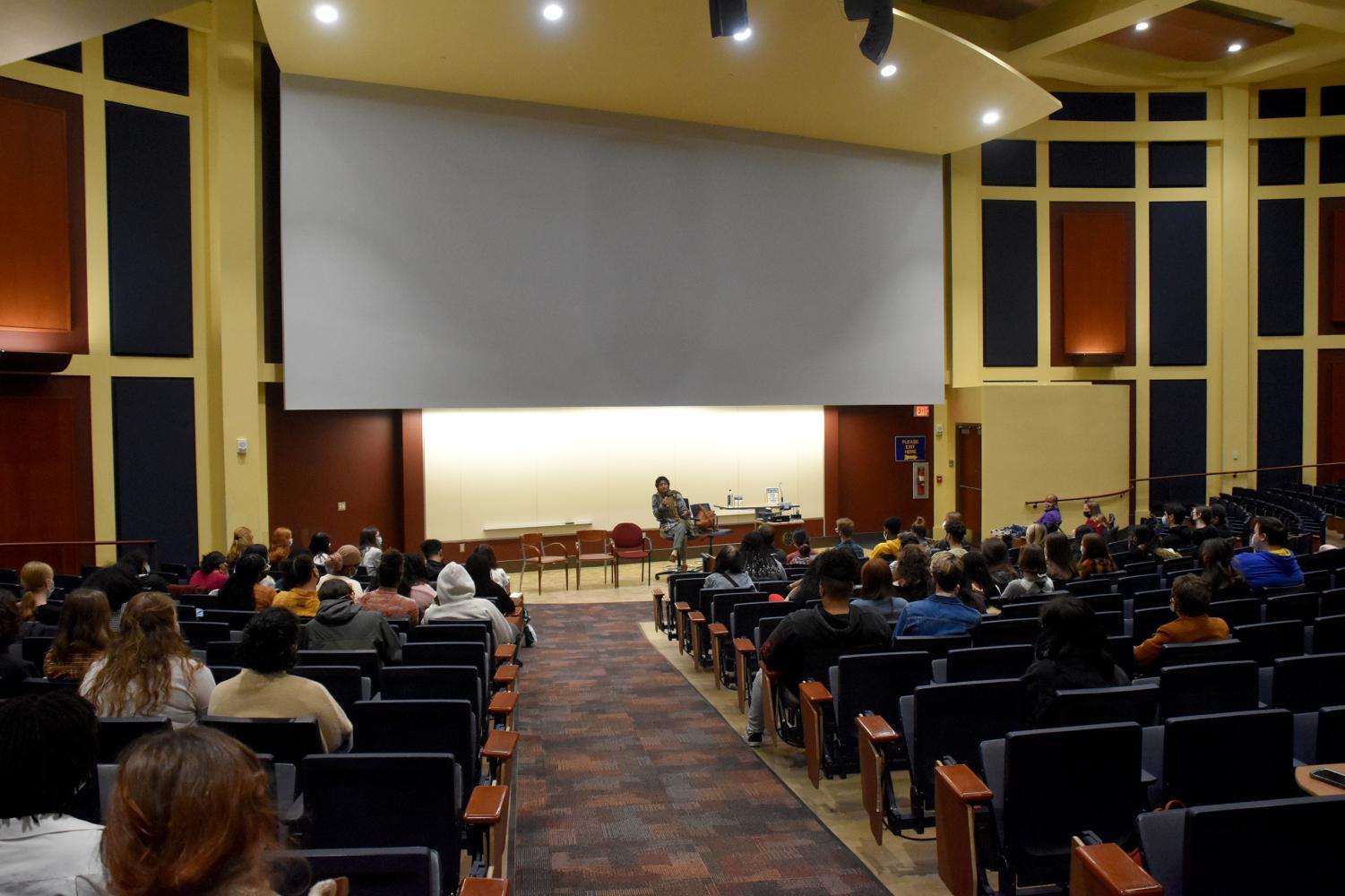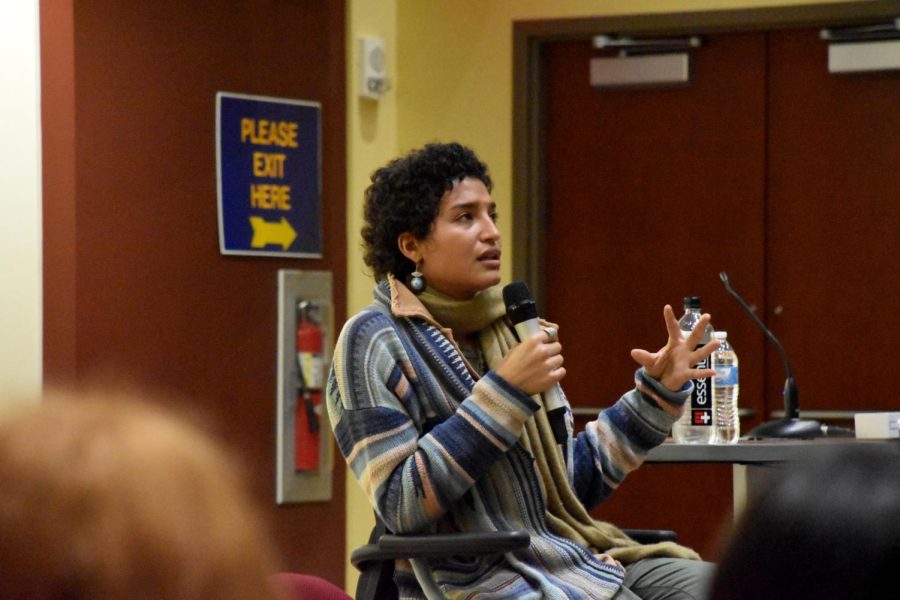Indya Moore brings advice, optimism to Rainbow Alliance event
Amaya Lobato | Staff Photographer
Indya Moore speaks to a crowd gathered at David Lawrence Hall as part of a Rainbow Alliance event on Friday.
March 27, 2022
In an effort to better understand how to navigate today’s political climate, Rainbow Alliance welcomed transgender actor and model Indya Moore to David Lawerence Hall this past week.
Moore, known for their role on FX’s hit show “Pose,” offered advice on a wide range of topics from microaggressions in the workplace to understanding one’s identity. Rainbow Alliance’s board moderated the event, which had about 100 attendees.
Moore said they came to campus with the intention of helping students navigate the current political climate, from the perspective of a queer Black person in America.
“I think now more than ever, even though the time and climate makes me feel like I need to question myself and my spiritual path, and what’s going on in the world, I realize with everything that is happening, the fact that we know something is wrong is what we should listen to,” Moore said. “Now more than ever, we should trust ourselves.”
Moore offered insight to the group on how they deal with microaggressions in the workplace.
“I have faith in people to learn through how I live. You wanna be micro-aggressive? Bring that micro-aggressive a– over here and give me a hug,” Moore said. “Be macro-calm.”
Moore said sometimes the best way to handle microaggressions from others is to let them learn it is wrong on their own.
“A lot of times people don’t know what they’re doing, they’re not aware of it — and responding just takes my peace,” Moore said. “Not engaging in the war sometimes allows the issue to resolve itself on its own.”
Caitlin Gill, a senior forensic science major and Rainbow Alliance member, said she enjoyed learning how she could better herself in the queer community.
“I liked hearing about what [Moore] had to say about the community and how we can better ourselves within it,” Gill said. “Just hearing about their experiences growing up as a queer trans person.”
Moore said although seeing other trans people provided them comfort, they were inspired to pursue a career in Hollywood by a variety of people.
“It wasn’t the visibility of trans people that gave me the permission to believe in myself,” Moore said. “I think connecting the will of trans people to the visibility of other trans people misplains a narrative that we are activated by each other. We are activated by each other, but our activations aren’t limited to each other. We are inspired by all types of people.”

(Amaya Lobato | Staff Photographer)
Jessica Ravenscroft, the Rainbow Alliance president, said the group had asked Moore to speak in the hope that they would bring a new perspective to campus.
“We were really hoping to have a different perspective on the trans experience, especially on the Black trans experience,” Ravenscroft said. “They have a lot of different experiences that I think are under-discussed in the community.”
In preparation for the Moore event and other Pride Week activities, Rainbow Alliance requested $35,000 in funds from Student Government Board earlier this semester. Rainbow Alliance received funding after adjusting the expected attendance number from 50-100 to 300-400 people.
Emily Miller, the group’s communications director, said she hopes that bringing intersectional speakers like Moore, who are able to speak to multiple experiences, will lead to increased diversity in campus speakers.
“I hope that Pitt brings in more people who are intersectional because I feel like a lot of times in movies, and even when the University is bringing someone in, the focus is, ‘We’re bringing in a Black speaker,’ or, ‘We’re bringing in a queer speaker,’” Miller said. “Which is very frustrating because people don’t treat intersectionality as normalized as it is.”
Miller said having Moore speak about their experiences allowed Rainbow Alliance to broaden the experiences that the group was able to talk about.
“I think bringing in people is always a good way to bring excitement,” Miller said. “At the end of the day, Rainbow can only speak to our own experiences and we can only do so much.”
Miller added that she was deeply touched by the time Moore spent after the event talking individually to each attendee.
“My favorite part is them taking the time to stand here and talk individually with every single person. I think that says a lot,” Miller said. “I would also understand if they were very tired and wanted to go home. But the fact that they are here, still talking, is amazing. It was initially supposed to be just the Rainbow board, but I’m really glad they opened it up.”
When asked what Moore wanted people to know about themself, they discussed their motivation towards growth and harmony for the world.
“I am committed to growing,” Moore said. “I really want people to know about me that I believe in a world that is free, equitable and harmonious for everyone — and that my visions also include people of privilege.”
Gill said listening to Moore’s advice was a great way to begin wrapping up Rainbow’s Pride Week.
“I think this was a really good way to sort of start to finish off the week. They are a very famous person, and very enjoyable to watch,” Gill said. “They’re very well-spoken on everything they know and it was just a happy way to end the week.”
Moore ended the event by urging the audience to prioritize how they treat others, saying they believe it is the change we need to better both ourselves and the world.
“What’s radical to me is learning how to treat people for real. Learning how to treat ourselves for real,” Moore said. “And to be an olive branch when the time comes. That will change the world.”
A previous version of this story said the event had 40 attendees. It had around 100. It also quoted Moore saying “micro-calm,” rather than “macro-calm.” The article has been updated to reflect this change. The Pitt News regrets these errors.








